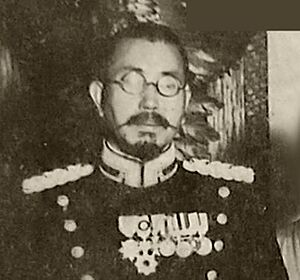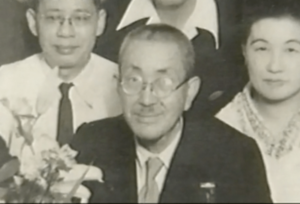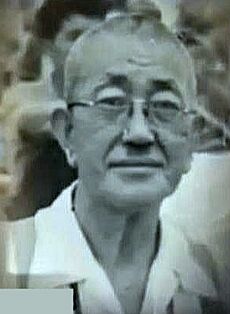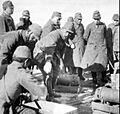Shirō Ishii facts for kids
Quick facts for kids
Shirō Ishii
|
|
|---|---|
 |
|
| Native name |
石井 四郎
|
| Born | June 25, 1892 Shibayama, Chiba, Empire of Japan |
| Died | October 9, 1959 (aged 67) Tokyo, Japan |
| Allegiance | |
| Service/ |
|
| Years of service | 1921–1945 |
| Rank | Surgeon general (lieutenant-general) |
| Commands held | Unit 731, Kwantung Army |
| Battles/wars | |
| Awards | Order of the Golden Kite, Fourth Class |
Shirō Ishii was a Japanese army medical officer and microbiologist. He was the leader of Unit 731, a special group within the Imperial Japanese Army. This unit focused on developing and using biological weapons during the Second Sino-Japanese War (1937-1945).
Ishii led harmful experiments on people, causing many deaths. These experiments were part of the biological warfare efforts. After World War II, the United States government gave Ishii immunity from prosecution. This was in exchange for information about his research for their own biological warfare program.
Contents
About Shirō Ishii
His Early Life
Shirō Ishii was born on June 25, 1892, in Shibayama, Chiba, Japan. He was the fourth son in a wealthy family that owned a lot of land. His family was also known for making sake, a Japanese drink.
Ishii went to Chiba Middle School and then to the Fourth Higher School. He was known for being very smart and having a great memory. He could remember difficult texts easily. In 1916, he began studying medicine at Kyoto University. He finished his studies in 1920.
Joining the Military
In 1921, Ishii joined the Imperial Japanese Army as a military surgeon. He worked at the 1st Army Hospital in Tokyo. His work was impressive, and he was able to go back to Kyoto Imperial University for more medical training in 1924.
During his studies, Ishii had some unusual habits. He would often grow bacteria in many dishes, treating them like "pets." His classmates sometimes found him difficult to work with. In 1925, he was promoted to surgeon captain.
Leading the Biological Warfare Project
By 1927, Ishii began to suggest that Japan should create its own biological weapons program. In 1928, he traveled to Western countries for two years. He studied how biological and chemical weapons were developed after World War I.
Ishii's travels helped him gain support from important military leaders. He was promoted to surgeon major in 1931. In 1935, he became a surgeon lieutenant-colonel.
On August 1, 1936, Ishii was given control of Unit 731. This unit had special research facilities. As the leader, Ishii oversaw many harmful experiments. These experiments involved testing biological weapons on people.
Ishii was promoted several more times. He became a surgeon colonel in 1938 and a surgeon major general in 1941. By March 1945, he was a surgeon lieutenant general.
Near the end of World War II, Ishii planned an attack called Operation Cherry Blossoms at Night. The goal was to spread plague fleas along the west coast of the United States. However, Japan surrendered on August 15, 1945, and the plan was never carried out.
Ishii and the Japanese government tried to hide their secret labs and experiments. But they were not fully successful. Today, the Japanese Army's Unit 731 War Crimes Exhibition Hall in Harbin, China, serves as a museum. It shows the terrible acts committed by the unit.
His Later Years and Death
In his final years, Shirō Ishii had trouble speaking clearly. He was in pain and used medication. He died on October 9, 1959, at the age of 67. The cause of his death was laryngeal cancer. His funeral was led by Masaji Kitano, who had been his second-in-command at Unit 731.
According to his daughter, Harumi Ishii, her father became a Roman Catholic shortly before he died. He was baptized and took the name Joseph.
On Screen
Shirō Ishii has been shown in movies and TV shows. Min Ji-hwan played him in the MBC TV series Eyes of Dawn. Gang Wang played him in the 1988 film Men Behind The Sun.
See also
- Josef Mengele
- Operation Paperclip
- Khabarovsk War Crime Trials
Images for kids
 | John T. Biggers |
 | Thomas Blackshear |
 | Mark Bradford |
 | Beverly Buchanan |






